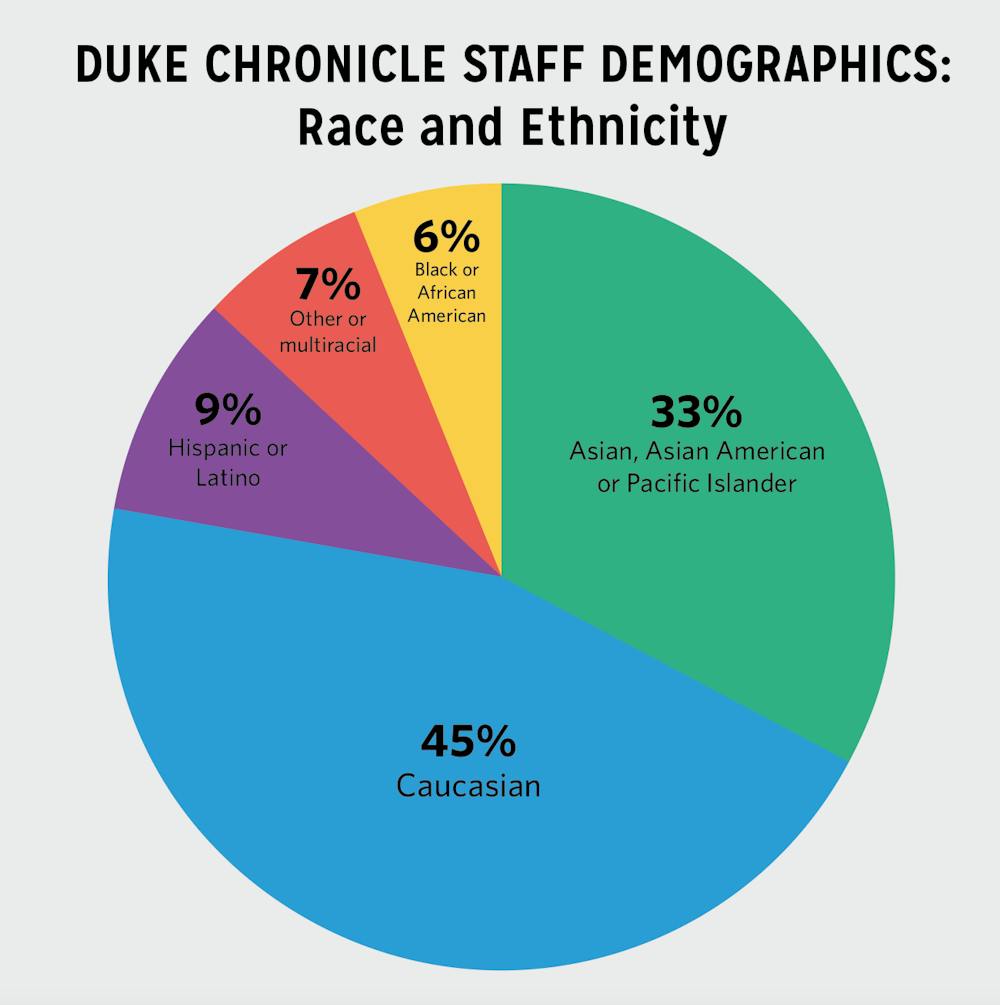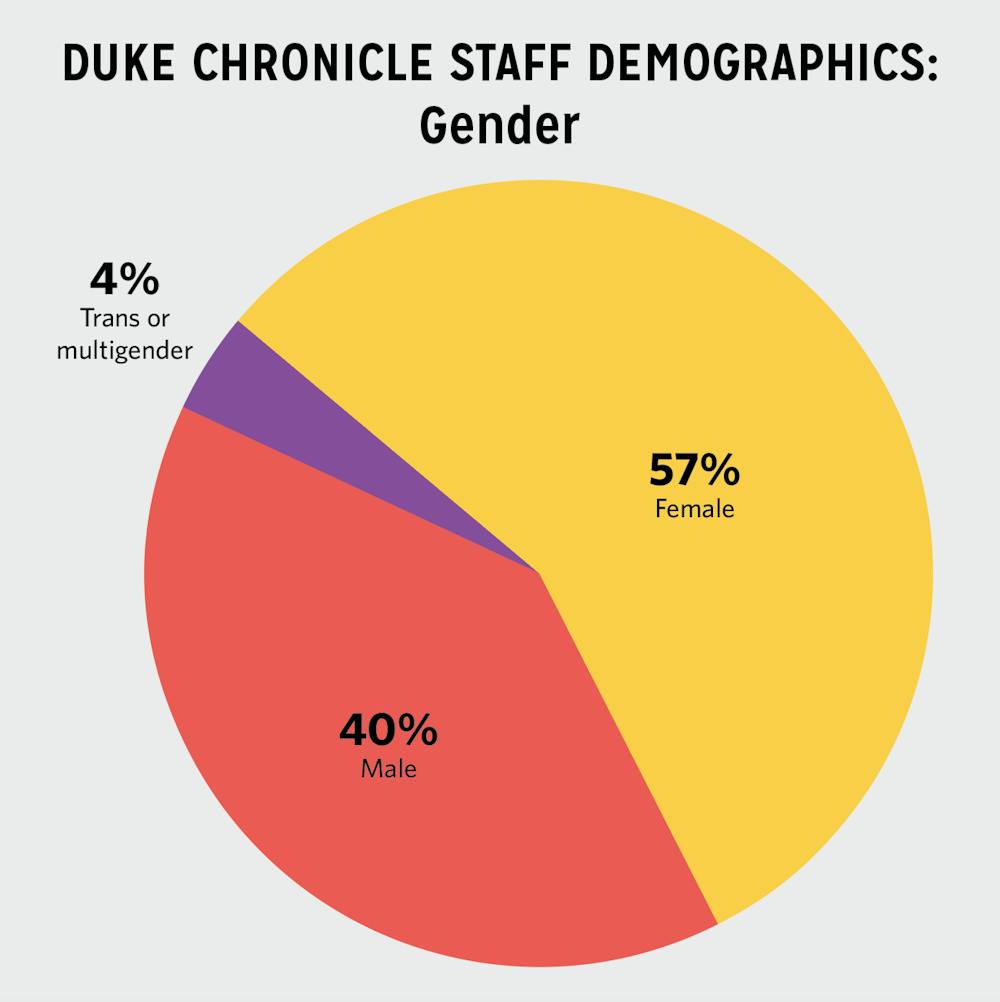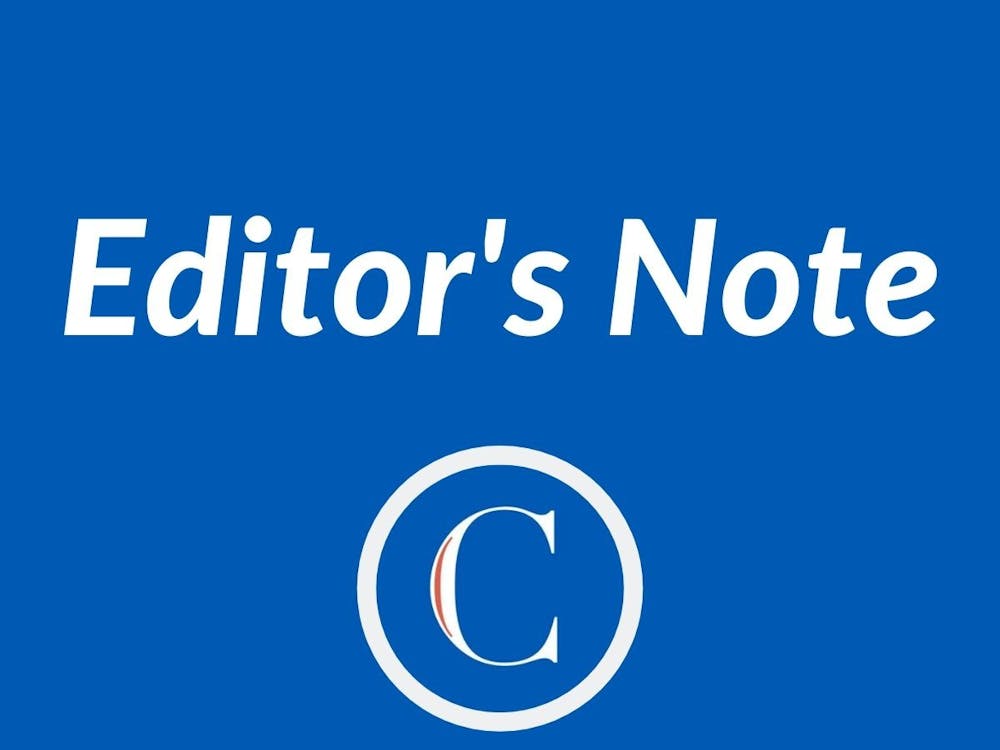Last June, The Chronicle made a commitment to promoting racial justice within the Duke community. The commitment was based on the idea of using student journalism as a platform to lift up marginalized voices. In particular, we pledged to “undertake a long-term and sustained effort” to ensure Black students and stories are heard. As we work toward achieving these goals, we would like to provide an update about our ongoing efforts regarding diversity and inclusion and encourage comments and suggestions from our readers.
The Chronicle’s goal is to create a working environment where everyone, regardless of background or identity, feels comfortable, safe and included in the community. We seek to build diverse staff with a range of perspectives, experiences, and opinions. This diversity is necessary to fulfill our mission to provide coverage that educates, promotes awareness and holds Duke accountable. Through our efforts, we hope to continue making The Chronicle a more equitable organization.
Our diversity and inclusion efforts have focused on three main areas. The first goal is to recruit staff from a variety of backgrounds, particularly identities that have not historically been well represented in The Chronicle. The second is to foster a welcoming environment within the paper so individuals from all backgrounds feel accepted and comfortable taking on leadership roles. The third is to focus on covering stories that give a voice to underserved audiences.
The Chronicle has not always upheld the standards of equity and inclusivity that we hope to achieve, but we are committed to improving our practices. During our newsroom diversity training, we learned that diversity is trust. In other words, we want to cultivate diverse voices within our newsroom and within the stories we publish to create trustworthy content. If you have a question, comment, or suggestion in this area for The Chronicle, please let us know below.
Demographic data
Chronicle staff were asked to complete a survey in December 2020 to provide insight into the paper’s demographics. The survey received 132 responses, which includes almost everyone on staff across all departments. “Staff” includes both staff members and editors, while “leadership” refers only to editors.
Of the respondents, 33% identified as Asian, Asian American or Pacific Islander; 6% identified as Black or African American; 45% identified as Caucasian; 9% identified as Hispanic or Latino; and 7% identified as other or multiracial.

When comparing these demographics to the Duke undergraduate population of Fall 2019, Asian Americans are overrepresented and African Americans are slightly underrepresented in The Chronicle. The proportion of caucasian and Hispanic staffers is a few percentage points higher than in the overall undergraduate population. However, compared to the college student population in the US in 2017, Hispanic or Latino and Black students are vastly underrepresented both at Duke and in The Chronicle.
Compared to general staff demographics, Asian, Hispanic or Latino, and multiracial staff are underrepresented in Chronicle leadership, while Caucasians and Black or African American staff are overrepresented.
In the current undergraduate Duke population, 52% of students are women. Of all the respondents, 57% identified as female, 40% identified as male and 4% identified as transgender or multi-gender. However, only 45% of individuals in leadership positions identified as female, while 49% identified as male.

The median family income for both staff and leadership is $125,000 to $200,000, which is representative of the median at Duke according to The New York Times. However, about 34% of staff is on need-based financial aid, which is significantly less than the 52% of Duke students on financial aid.
Get The Chronicle straight to your inbox
Sign up for our weekly newsletter. Cancel at any time.

Additionally, 8% of staff identify as first-generation, 11% identify as low-income and 7% are international students. The percent of first-generation and low-income students on leadership are similar to staff, but none are international students.
New practices
Sixteen upper-level editors started the semester with a newsroom diversity training session led by the Maynard Institute. The training addressed the fact that journalists throughout history have been facilitators and perpetrators of systemic racism. Participants examined their own fault lines or biases—race, class, gender, generation, geography, sexual orientation—and the consequences.
The Chronicle amplified recruitment efforts by reaching out to on-campus identity groups, particularly those that are underrepresented on staff. Within the paper, each department instituted a revised mentorship structure to give new staff members opportunities to build relationships with current editors, with the goal of encouraging each staffer to feel comfortable pursuing leadership roles.
Beyond recruitment, The Chronicle examined the equity of our news coverage through numerical score cards, word analysis and external audits. While still ongoing, we found that The Chronicle tends to publish stories about underrepresented communities at Duke only when significant events occur within those communities. The analysis also found that coverage of underrepresented communities is generally focused on challenges rather than successes. The external audit recommended interviewing more diverse sources for articles across the board.
The news department has instituted a new system for writers and editors to integrate coverage of diverse communities into our everyday work habits. When developing story ideas, writers must consider how these stories can integrate diverse voices and representation and whether those stories focus on the community or on Duke as an institution. Editor-in-Chief Matthew Griffin and I have begun meeting with representatives of community and identity groups on campus to seek feedback on our coverage and ask for story ideas.
To help writers use language that is fair, accurate and inclusive, The Chronicle put together a resource for reporting and writing across identities. The resource includes guides such as the Global Press Style Guide and the National Association of Black Journalists Style Guide.
We've also expanded the ways readers can suggest topics of interest that we may have overlooked, including creating a texting service, to broaden the scope of the stories we cover.
Lastly, The Chronicle held a town hall in October that gave staff an opportunity to discuss questions and concerns about inclusivity. The 83 attendees took a survey in which they ranked whether they agreed or disagreed with certain statements on a 1-5 scale. All statements received an average rating above four except two statements.
Statements receiving high ratings included “The Chronicle cultivates a culture where people of all backgrounds are welcomed and valued” and “I can approach my editors about any concern I may have regarding diversity and inclusion matters, and they will handle it appropriately.” The two statements people agreed with the least were “I feel comfortable taking on leadership roles” and “The Chronicle recruits people from a variety of backgrounds, especially those that haven't historically been well represented.”
Looking ahead
In the coming months, The Chronicle will pursue a content audit with an external organization to continue to identify areas to improve our coverage. Our goal is to be a partner and ally with the many diverse communities at Duke.
We are also looking to expand the role of diversity, equity and inclusion coordinator role into a team composed of individuals from each department, who will collaborate on initiatives to advance our efforts.
Lastly, we are planning to create a fellowship program for new staff members who identify with groups that are underrepresented in The Chronicle. The mission of the fellowship will be to provide a structure that encourages staff members to take on leadership roles.
The Chronicle has made important steps forward in the right direction, but we are not yet in a place that we consider diverse and inclusive for our staff and our readers. Going forward, we plan to continue monitoring the inclusivity of our coverage and diversity within The Chronicle’s staff. Issues of diversity are deeply rooted within Duke and our paper, so we know addressing them will require long-term dedication to solutions that shift our culture and content. We are committed to making The Chronicle a more equitable paper that truly serves and represents all members of the Duke community.
Shannon Fang is diversity, equity and inclusion coordinator.

